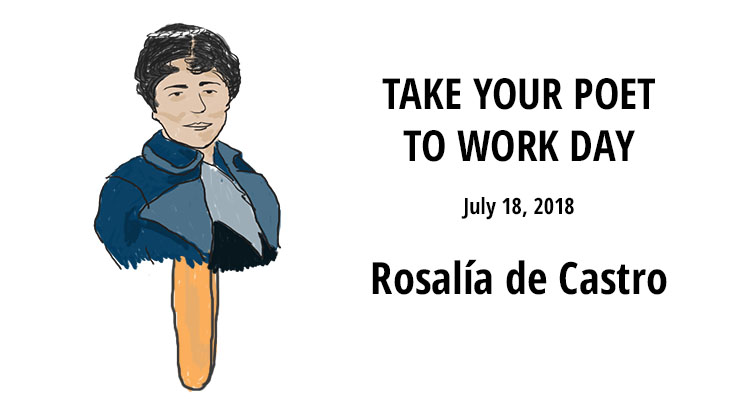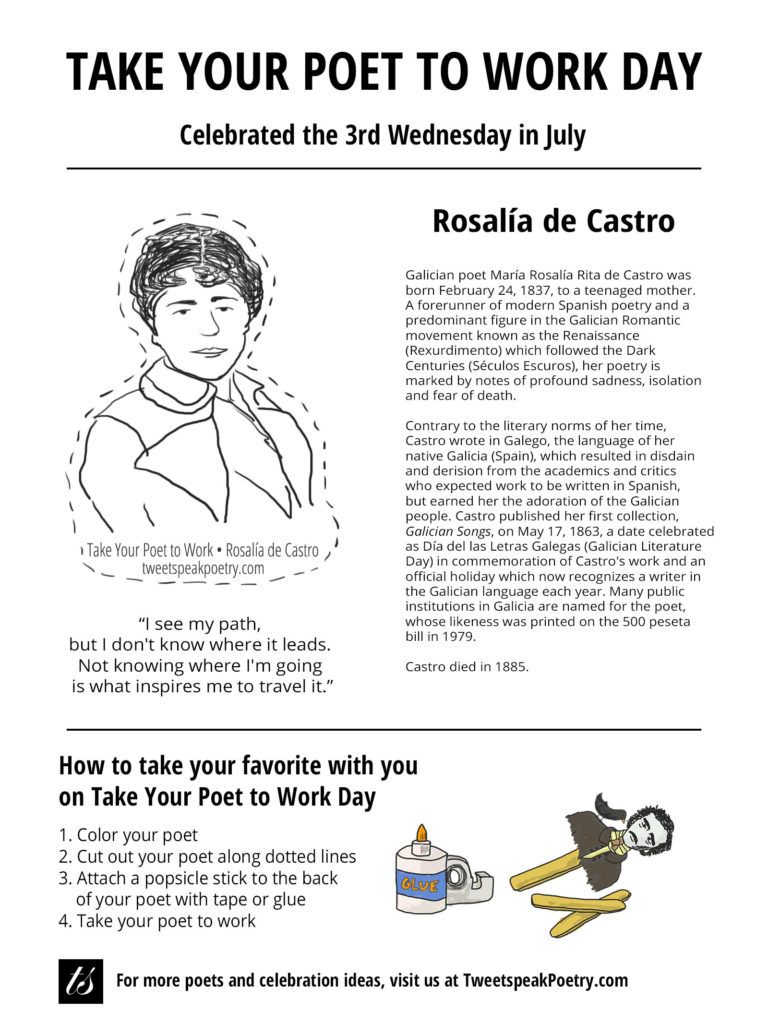Summer is one of the happiest seasons at Tweetspeak Poetry, because it is the season of Take Your Poet to Work Day (or, you know, to the beach). It’s one thing to start every day with a poem (we recommend it). But how great would it be to start your day with a poet? On Take Your Poet to Work Day, we encourage people around the world to take their favorite poet to work for the day.
Take Your Poet to Work Day is coming July 18, 2018
To help you play and celebrate with us, we’re releasing poets each week in a compact, convenient format you can tuck in your pocket, tool belt, or lunchbox.
We started our celebration five years ago with Sara Teasdale, Pablo Neruda, T. S. Eliot, Rumi, Edgar Allan Poe, and the reclusive Emily Dickinson (for folks who work at home).
We even released a full collection, The Haiku Masters: Matsuo Basho, Yosa Buson, and Kobayashi Issa.
In 2014, we added Langston Hughes, Adrienne Rich, John Keats, William Butler Yeats, Christina Rossetti and the beloved 20th-century American poet, Sylvia Plath.
In 2015, we introduced the Bard of Avon William Shakespeare, beloved poet Maya Angelou, and iconic American poet Robert Frost, Russian poet Anna Akhmatova, Polish poet Wisława Szymborska, and America’s poet, Walt Whitman.
In 2016, English Romantic poet William Wordsworth, joined in, along with Elizabeth Barrett Browning, Irish poet Seamus Heaney, and English poet and novelist Emily Brontë, Australian poet and activist Judith Wright, and Henry Wadsworth Longfellow.
Because you can never have too many poets in your lunch box (or your desk drawer), we launched a new school-year celebration in April, Take Your Poet to School Week, with some favorites for the younger (and younger-at-heart) poetry readers: Shel Silverstein, Ogden Nash, Robert Louis Stevenson and the always delightful Mother Goose.
This year, we started off our new releases with Jorge Luis Borges. Today, meet Rosalía de Castro.
Take Your Poet to Work: Rosalía de Castro
Get your own Rosalía de Castro Take Your Poet to Work Printable that you can print, color and cut out for the big day.
Galician poet María Rosalía Rita de Castro was born February 24, 1837, to a teenaged mother. A forerunner of modern Spanish poetry and a predominant figure in the Galician Romantic movement known as the Renaissance (Rexurdimento) which followed the Dark Centuries (Séculos Escuros), her poetry is marked by notes of profound sadness, isolation and fear of death.
Contrary to the literary norms of her time, Castro wrote in Galego, the language of her native Galicia (Spain), which resulted in disdain and derision from the academics and critics who expected work to be written in Spanish, but earned her the adoration of the Galician people. Castro published her first collection, Galician Songs, on May 17, 1863, a date celebrated as Día del las Letras Galegas (Galician Literature Day) in commemoration of Castro’s work and an official holiday which now recognizes a writer in the Galician language each year. Many public institutions in Galicia are named for the poet, whose likeness was printed on the 500 peseta bill in 1979.
Castro died in 1885.
From the Cadenced Roar of the Waves
From the cadenced roar of the waves
and the wail of the wind,
from the shimmering light
flecked over woodland and cloud,
from the cries of passing birds
and the wild unknown perfumes
stolen by zephyrs
from mountaintops and valleys,
there are realms where souls
crushed by the weight of the world
find refuge.
—Rosalia de Castro, tr. by Kate Flores
Post and illustrations by Will Willingham.

Click to get 5-Prompt Mini-Series
- Earth Song Poem Featured on The Slowdown!—Birds in Home Depot - February 7, 2023
- The Rapping in the Attic—Happy Holidays Fun Video! - December 21, 2022
- Video: Earth Song: A Nature Poems Experience—Enchanting! - December 6, 2022



L.L. Barkat says
What a beautiful poem from Castro (and it fits right in with our current poetry prompt, with its “shimmering light/flecked over woodland and cloud”!
Donna Falcone says
Oh wow. That poem is so rich and….. well, felt.